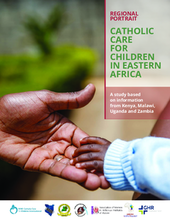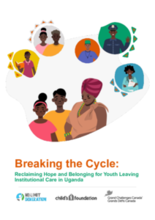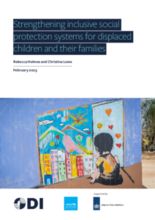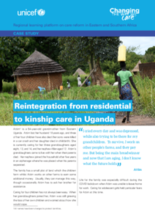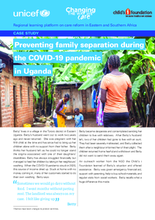This country page features an interactive, icon-based data dashboard providing a national-level overview of the status of children’s care and care reform efforts (a “Country Care Snapshot”), along with a list of resources and organizations in the country.
demographic_data
childrens_living_arrangement
children_living_without_bio
social_work_force
key_stakeholders
Key Stakeholders
Add New DataOther Relevant Reforms
Add New Datadrivers_of_institutionalisation
Drivers of Institutionaliziation
Add New Datakey_research_and_information
Key Data Sources
Add New DataThe Children Act (Uganda)
Country Care Review: Uganda
Prevalence and number of children living in institutional care: global, regional, and country estimates
The National Integrated Early Childhood Development Policy Action Plan (2016-2021) of Uganda
Catholic Care for Children in Uganda: A Family for Every Child - Findings from a Midterm Evaluation
Acknowledgements
Data for this country care snapshot was contributed by a consultant with the Data for Impact (D4I) Project at Palladium Group LLC.
Displaying 11 - 20 of 393
A group of talented young dancers from Uganda warmed hearts around the world after earning the coveted “golden buzzer” on Britain’s Got Talent.
This regional portrait describes Catholic-sponsored care for children in Eastern Africa using data from Kenya, Malawi, Uganda and Zambia. The first large study of its kind, it focuses on children who are particularly vulnerable—those at risk of or those who have been separated from their families. Many are in institutional care. This portrait also describes growing efforts, led by women and men religious, to ensure children can grow up in safe, nurturing families or family-like environments rather than institutions.
This is an introduction to the training series produced by Child's i Foundation and No Limit Generation and focuses on four key areas: trauma and stress, depression and suicidal thoughts, anxiety, and loss and grief.
This webinar provides an opportunity to share experiences on the transformation of residential care. The webinar will begin with an introductory presentation by Rebecca Nnep, Senior Technical Advisor, Better Care Network, who will shed light on emerging lessons and ongoing efforts/work done to ensure effective transitioning.
Uganda Care Leavers/Association of Care Leavers Uganda released this statement in response to the appearance of Ugandan children on an April 15 episode of Britain's Got Talent. These care leavers expressed concern about the institutionalisation of children and the need to instead promote family care for all children.
In this course you will learn from Ekisa Ministries, a nonprofit organization located in Jinja, Uganda, that has been working with children with disabilities for over a decade. The hope is that you will finish this course with an understanding of what it may look like for your organization to incorporate children with disabilities and help them find their way home.
Authored by the ODI in partnership with UNICEF, this paper assesses the benefits of inclusive social protection from a displacement and child-centred perspective.
This case study details the experience of Attim, a 54-year-old grandmother from Eastern Uganda who provides care for her grandchildren after they left residential care. Social workers in Uganda often find that placement with extended family members is the most appropriate option for children leaving residential care.
This case study tracks the impact of family support services to a Ugandan mother and her family during the COVID-19 pandemic in an effort to prevent family separation.
The Regional Learning Platform on care reform for Eastern and Southern Africa provides an opportunity for government, UNICEF and others involved in care reform

